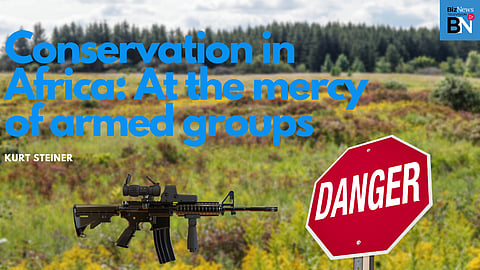Conservation in Africa is at the mercy of armed groups – Kurt Steiner
By Chris Steyn
Kurt Steiner, the first head of Law Enforcement for African Parks, now an independent consultant, reveals how at least 24 armed groups have settled in conservation areas in Africa; how militias in one area alone are netting $ 70 million a year from the charcoal trade; and how over 1000 rangers have lost their lives trying to protect the Continent's wildlife and its natural heritage.
Watch here
Listen here
Armed insurgents are using Africa's national parks to hide in – and plunder for profit.
This has seen over 1000 rangers lose their lives trying to protect the continent's wildlife and its natural heritage.
Kurt Steiner, the first head of Law Enforcement for the African Parks Network, now an independent consultant, gives BizNews an inside view of the battles being fought to hold the line.
He reveals that:
- At least 24 armed groups have settled in conservation areas in Africa;
- Armed battles are taking place in biodiversity hotspots on a weekly basis;
- As much as $70 million a year is being netted by militias through the charcoal trade out of one park alone;
- Entire parks are being depleted;
- Some armed groups are so highly organised, they even have a web page and crowdfunding campaigns;
- In some areas local government forces have withdrawn, leaving conversation staff to deal with insurgents;
- At least 1000 rangers have been killed in Africa since 2006.
Steiner points out that the rangers should be carrying out domestic policing, not military tasks. "They're not there to engage in pitched battles; they're there to enforce the law. But where that's not possible, unfortunately they have to do the best they can to protect themselves and those it is their duty to protect."
Meanwhile, "if there is a medical evacuation necessary, it can take days or even up to a week or two to get to that area if they can't walk themselves out. We know of parks where there's not a single road within the entire protected area. So…logistical difficulties in resupplying, deploying guys, recovering them when necessary. All of these add to the big challenges centred on a ranger's life."
He says one of the biggest obstacles is a lack of funding to properly train, equip and keep employed enough rangers to protect Africa's national parks.
"We've seen in some cases where funding has been available to train rangers and at the end of a program you might have 200 trained law enforcement officers. Yet there aren't the funds to actually continue their salaries and their employment; so they're let go. Now what you have is a couple of hundred guys that know the bush, have been taught the skills, and actually have no job. So what are they going to turn to?"
Steiner fingers corruption is one of the biggest obstacles in combating this violent threat to conservation: "We're seeing a lack of resources, we're seeing resources being diverted elsewhere and embezzled. Corruption, if that could be handled, if these parks could gain strong government support, that would be probably the largest problem whatsoever taken care of."
Read also:

